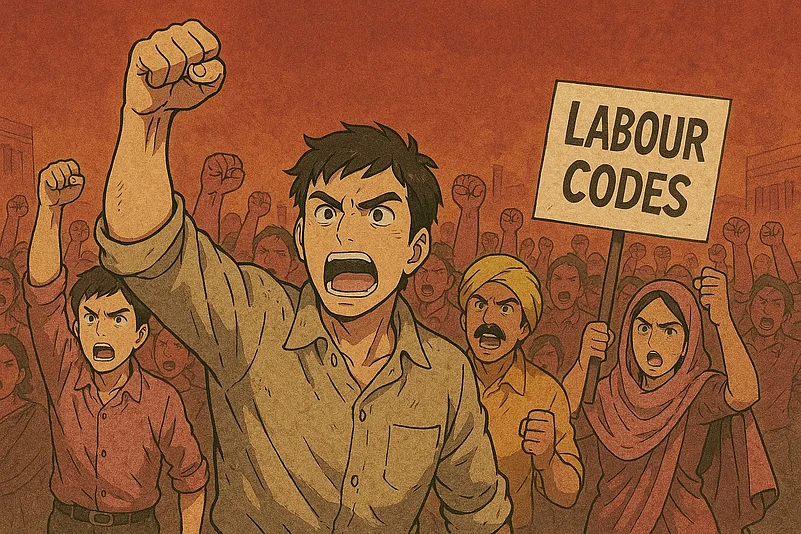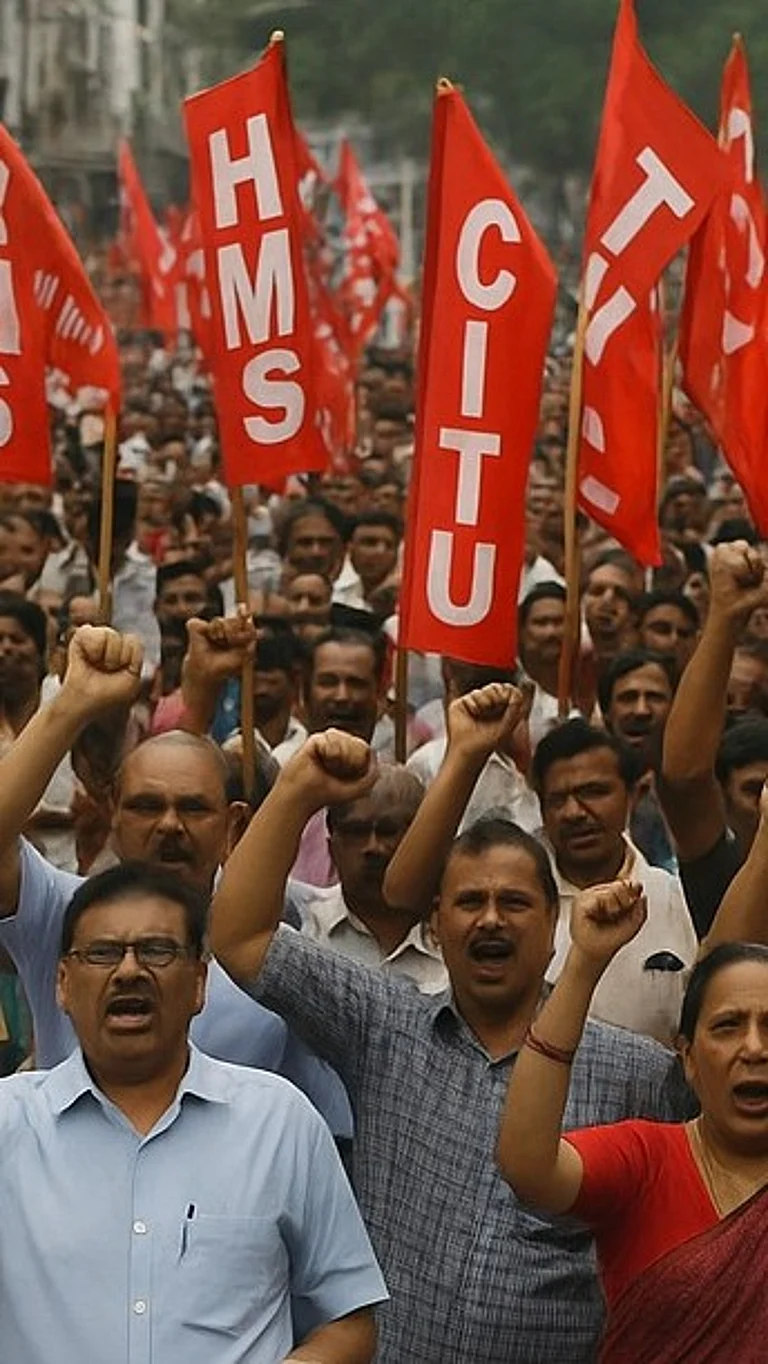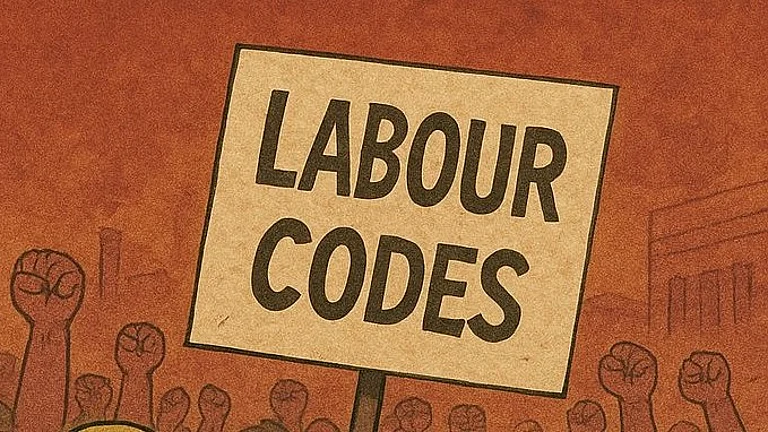Ten central trade unions have called for a nationwide "Bharat Bandh" today, protesting what they call anti-worker labour policies of the Narendra Modi government. This is not the first time India’s streets have echoed with discontent over Centre’s labour reforms. Late last year, even as the Centre marked a decade of its Make in India initiative, trade unions staged protests in different cities against the sweeping changes to labour laws introduced in 2019.
This time, the unions are calling for a more prolonged fight with over 25 crore workers expected on the streets today. In a joint statement, they urged workers to make the general strike a “grand success”, a show of strength and a warning of battles to come.
But the central government is not sweating. A day ahead of the strike, as many as 213 trade unions formally informed the Centre they would not join the protest. Officials at the Union Ministry of Labour and Employment dismissed the strike as inconsequential, pointing out that the contested reforms are already being implemented across much of the country.
Indeed, both BJP- and opposition-ruled states, including Punjab, Himachal Pradesh, Karnataka, Jharkhand, Telangana, Tamil Nadu, and Jammu & Kashmir, have already rolled out majority of the reforms embedded in the four new labour codes, which are yet to be formally notified by the Centre. Only a few states, notably West Bengal and Kerala, have resisted most of the changes.
“The protest serves no purpose,” says a senior government official. “Almost all states are on board with the reforms. Now, whether we notify them or not is immaterial, since the states are already implementing them. If the unions have concerns, they should take it up with the states.”
Trade unions, however, allege arm-twisting. Amarjeet Kaur, general secretary of the All India Trade Union Congress, recently told The Hindu that the Prime Minister’s Office has been pressuring states to amend their labour laws in line with the new codes. “We have warned states governments against implementing them,” she said.
From the Backdoor
To put things in perspective, labour laws in India fall under the Concurrent List of the Constitution, meaning both the Centre and the states are empowered to legislate on them. The Centre frames the labour codes and issues model rules under each. States, in turn, are expected to notify their own rules, either by adopting the model guidelines or tailoring them to local needs, to operationalise the Codes within their jurisdictions. In cases where central and state laws conflict, the central law generally prevails, unless the state law has received presidential assent, which allows it to override the central legislation.
Between 2019 and 2020, the Modi government undertook one of the most ambitious labour reforms in independent India by consolidating 29 labour laws into four comprehensive codes: Code on Wages (2019), Industrial Relations Code (2020), Code on Social Security (2020), and Occupational Safety, Health and Working Conditions Code (2020).
The stated aim was to simplify India’s complex labour regime, reduce compliance costs, attract investment, support decriminalisation of labour violations, and create a more flexible dispute resolution system.
But the codes have never been formally enforced by the Centre. Political resistance and lack of consensus, particularly from trade unions, have stalled their nationwide roll-out. Now, with state governments selectively implementing the codes, unions feel increasingly sidelined. Many claim they were never consulted during the drafting process and are now left with no choice but to mount a renewed protest.
For instance, they argue that the government has deliberately not convened the Indian Labour Conference for more than a decade. Government, on the other hand, remains sceptical of the outcome of any such event. “We are open for a discussion if they particularly tell us about their issues related to the Codes. But their main agenda is to push-back the codes altogether,” says another senior official.
Trade unions believe that the new codes dilute worker protections under the guise of reform. They point to provisions like the increased threshold for layoffs without government approval and the weakening of welfare boards for informal workers. Safety regulations, they say, have become more self-regulated, eroding oversight.
The unions, in a recent statement, said the four codes are meant to “suppress and cripple the trade union movement, increase working hours, snatch workers’ right to collective bargaining, right to strike, and decriminalise violation of labour laws by employers.”
Overall, they see the reforms as skewed in favour of employers, with little room left for collective bargaining or consultation.
Chasing Capital
One thing common across Indian states today, regardless of ideology or party in power, is the relentless pursuit of capital investment. Industrial growth has become a political imperative. Last year, even as Samsung workers in Tamil Nadu staged a protest over stagnant wages, Chief Minister MK Stalin was in the US pitching his state as an investor-friendly destination. A more striking example is Kerala, long known for its leftist politics, which is now actively wooing private capital to rescue its faltering economy. What was once a Gujarat-specific showcase through the Vibrant Gujarat summit has now become a national phenomenon, with nearly every state hosting its own version of an investment conclave.
This all-out chase for capital by states has, in a way, convinced the Centre that it can afford to sit back. Government officials, while acknowledging the potential disruption to public services, are not particularly concerned about any serious economic fallout from the protests. In their view, the agitation is unlikely to sustain momentum. Despite participation from farmers and rural workers, the widespread acceptance of the labour reforms by most states, and the absence of major trade unions from the strike, has reassured the Centre that there is little reason to worry.
Union leader Kaur, however, believes states are mistaken if they think rolling out the labour codes will help attract investments. Speaking at a Delhi event on April 7, held to discuss the labour reforms, she had argued that investments have not happened in India because of government’s policies and the global economic slowdown. She questioned the appeal of India as an investment destination amid rising communal tensions and law and order concerns. “What is left for others when everything is in the hands of Adani and Ambani,” she asked, blaming crony capitalism.
As the Bharat Bandh unfolds today, what is at stake is more than just a clash over labour policies. It is a test of how much resistance trade unions can muster in a battle they believe is just beginning, even as the Centre considers it already won.

































